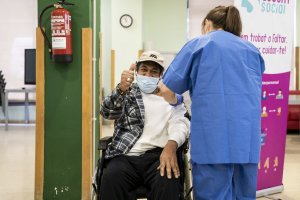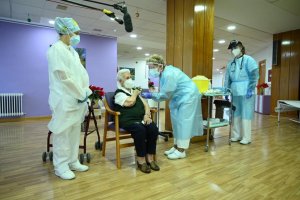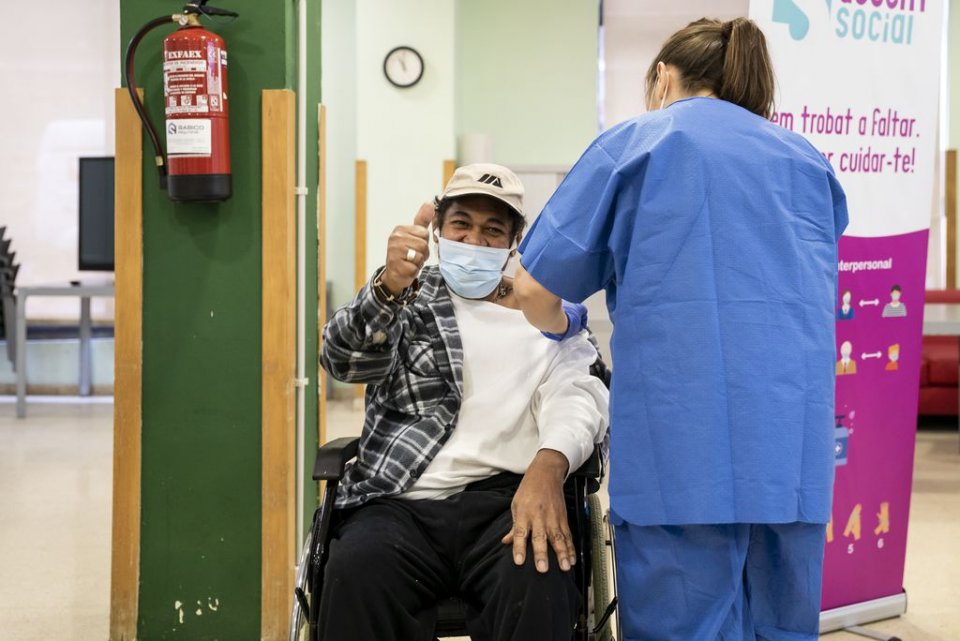Latest: Coronavirus in Spain figures (5 Apr)
ALSO READ (15/3/21): Spain halts use of AstraZeneca vaccine for 15 days, following other EU states
#UPDATED below on 10 Feb at 14h in Spain.
Spain’s health ministry has also said that citizens under the age of 55, without major health complications but who have previously contracted Covid-19, will have to wait six months from their diagnosis before receiving a vaccine. The measure will apply to the three vaccines currently being distributed in Spain (Pfizer, Moderna and AstraZeneca) and is a provisional measure pending further research.
A major British study published last week found that 99% of participants who had previously tested positive for Coronavirus retained antibodies for three months, while 88% still had them after six months. Spain’s health ministry justified the new measure by stating that cases of re-infection within six months are ‘exceptional’.
Full original report:
As Spain prepares to now start the second phase of its three-phase Vaccination Strategy, the government and regional health authorities have had to adapt to changing circumstances. This is partly due to delays and adjustments in the quantities delivered of the Pfizer-BioNTech vaccine, but also due to the changes in criteria regarding the age groups to receive jabs of the AstraZeneca-Oxford vaccine.
As announced by the Spanish government in late November, the initial Vaccination Strategy was to first vaccinate 2.5 million citizens against Covid-19 from January to March 2021, with the government having divided the population into 15 groups to determine the priority order, with care home residents and their health carers given top priority, followed by other healthcare workers and adults with severe disabilities – all during the first phase of three phases.
The second phase of vaccinations initially aimed to cover other critical groups through to June, as the number of doses available as part of the EU joint purchase scheme was expected to ‘increase progressively’. The third phase was then expected to cover the rest of the Spanish population. The Health Minister at the time, Salvador Illa, said that 70% of the population would be vaccinated by the end of summer 2021, and that by then the country would have achieved ‘herd immunity’. This target, however, looks difficult to reach.
Although Spain’s central government has decided upon the sequence of priority groups for Covid-19 jabs, the health bodies of each of the 17 regions are responsible for the management of the administration of vaccines.
Vaccinations with doses of Pfizer-BioNTech commenced on 27 December, with a 96-year-old lady living in a residential care home in the region of Castilla-La Mancha being the first person in Spain to be vaccinated. She later received her second jab on 18 January.
Since the start of the year, there have been reports of care home residents and workers having their vaccination appointments cancelled more than once due to the lack of doses, and there have been many headlines of high-ranking officials jumping the vaccine queue.

Whilst some regions in Spain have now completed phase one of the overall Vaccination Strategy, there is overlapping of phases one and two in several regions to allow for maximum efficiency. The first priority group of the second phase is the over-80s, which accounts for 2.8 million of the population and a staggering six out of every ten deaths to date from Covid-19.
This group, however, will not be administered the AstraZeneca-Oxford jab which began to arrive to the country at the weekend. On Friday, the Spanish Public Health Committee set the maximum age for receiving the AstraZeneca vaccine at 55. As a result, the over-80s will have to be administered one of the other vaccines authorised for use in the European Union. The Public Health Committee went on to imply that essential workers up to 55 years of age would now become a priority for the AstraZeneca vaccine, thus receiving inoculation earlier than expected within the framework of the Vaccination Strategy. 196,800 doses of the AstraZeneca vaccine have already arrived in Spain, according to the latest figures [up to 9 Feb].
Last week Spain’s new health minister, Carolina Darias, said that 1.8 million doses of the AstraZeneca vaccine would be arriving in Spain during February, and that a further 2.7 million doses of the Pfizer vaccine would also be delivered in March.

The groups of essential workers who are now expected to receive the AstraZeneca vaccine during the adjusted second phase of the overall strategy include the security forces (national, regional and local police, as well as the Guardia Civil), the military, firefighters, teachers (early childhood education, special needs, primary and secondary school teachers), prison officials, forensics, physiotherapists, pharmacists, dental technicians, speech therapists, clinical psychology personnel and epidemiological surveillance public health technicians.
The total numbers of each group are still unknown and expected to be clarified over the coming weeks. What is certain, however, is the largest group – the teachers – a total of some 760,000 between infant, primary and secondary, according to union figures. This number accounts for more than the total of security forces, military, prison officials and firefighters combined. Teachers have been one of the most controversial decisions, with some arguing that their work environment holds less of a risk factor than others. Counter-arguments have been made that the profession has assumed a vital role in society by keeping schools open, and the vaccine is a due reward for the sacrifice made.
There could still be variations in the priority groups decided by each regional authority, within the framework of the central government’s overall strategy of three phases. Last week, Isabel Díaz Ayuso, president of the Madrid regional government, said that waiters, teachers, taxi drivers and supermarket checkout staff in the region could be prioritised for receiving the Covid-19 vaccine.
Latest figures [to 9 Feb] show that Spain has now received 2,412,555 doses of Covid-19 vaccines (from Pfizer-BioNTech, Moderna and AstraZeneca), and that 2,167,241 jabs have been administered. This is 89.8% of total vaccines received. 838,782 people have now received a second jab. In a separate report, updated daily, we publish the amount of vaccines received and administered for each region in Spain: Covid-19 Vaccinations in Spain
Foreign residents in Spain
For all foreign nationals who are legally resident in Spain, vaccine entitlement is included in the government’s Vaccination Strategy. In early December, the strategy outlined that ‘each person must be considered and treated with equal dignity’, underlying that the process in Spain is universal and free of charge – with the aim to eventually inoculate the entire population, regardless of their nationality or type of health insurance. The only exception are tourists and owners of holiday homes (not permanently resident in Spain), who are understood not to be considered for the programme.
As the Vaccination Strategy is a public health programme, no priority will be given to those with health insurance or those who wish to pay for the vaccination privately. Foreign residents who are legally registered in Spain or have regional public health cards will be contacted by the health authorities of each region for vaccination. It has been recommended that regional health service updates are checked regularly and that individuals do not call health centres with enquiries as to avoid saturating the system.
Catherine Dolan also contributed to this report from the Valencia region.
Click here for all reports on Coronavirus in Spain and for specific reports related to Covid-19 Vaccinations.
ALSO READ: Spain will not give AstraZeneca vaccine to citizens aged over 55
ALSO READ: Madrid might prioritise waiters, taxi drivers, teachers for Covid-19 vaccine
ALSO READ: Spain to keep a register of citizens who refuse Covid-19 vaccine
ALSO READ: Spain’s Health Ministry divides the population into 15 groups for vaccination
ALSO READ: Spain’s ‘Covid-19 Vaccination Strategy’ – all the key points



5 comments
Thank you for this report, It is very helpful, however, can you please tell me how a foreign legal resident under not yet at retirement age and therefor not eligible for a SIP, who only has Private Health Insurance, can access the vaccine at the appropriate time re the phases?
If you are a foreign national legally resident in Spain, then you should be registered with the appropriate local authorities and will be contacted in due course by them. Each region will have different dates to commence each phase, depending on the region’s overall population and the priority groups that they make. We hope this helps.
What will the over 70s get our injection.
I am over 70 and I have Emphysemia ( C.O.P.D. ) does anyone know what priority level I am in.
I am being told the Saluds and G:Ps do not have any notification when they will receive them.
I believe you are in the 5B group with everyone over 70.